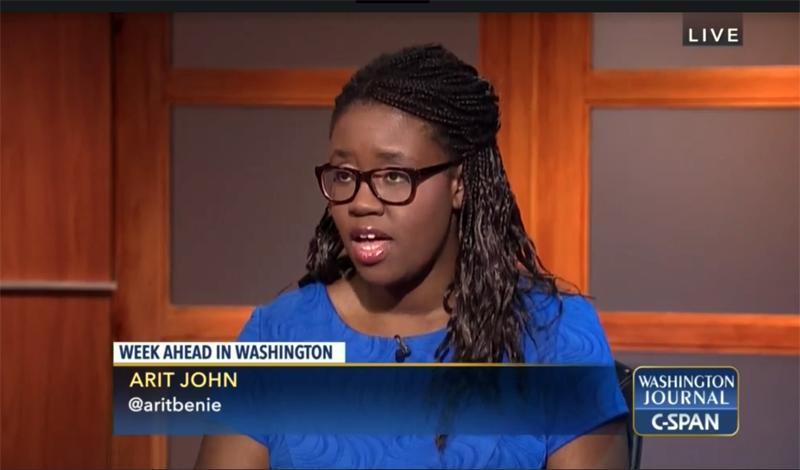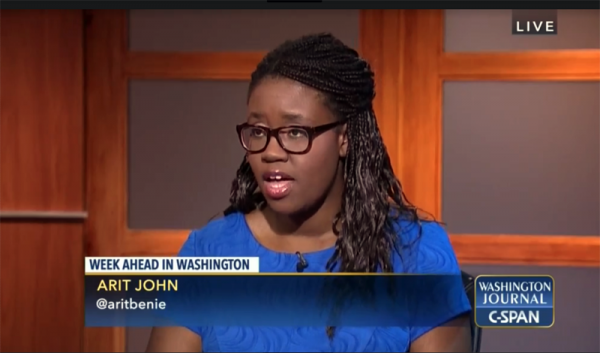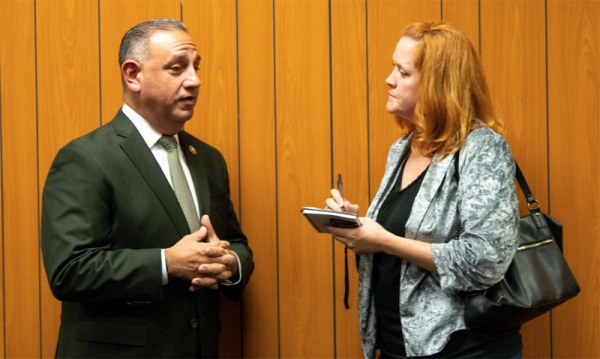KID REPORTERS’ NOTEBOOK
Covering Politics “Through the Lens of the Pandemic”


Annika interviews Los Angeles Times political reporter Arit John via video.
The coronavirus pandemic has affected several aspects of the presidential election, including journalism. I recently spoke with two political reporters from two of the largest newspapers in Southern California. Arit John reports for the Los Angeles Times, and Brooke Staggs files stories for The Orange County Register.
John, who has been a reporter for eight years, is covering the presidential election. Staggs, who has been a reporter since 2006, mostly covers state and local elections. Both journalists are covering the presidential race between Republican incumbent Donald Trump and his Democratic challenger, Joe Biden.
The reporters’ responses to my questions below have been lightly edited for brevity and clarity.
What has your experience covering this election been like so far?
John: It’s been really weird. For this election, early on, the candidates weren’t holding events. Then there was a big chunk of time in May, June, and July when a lot of reporters were just covering the coronavirus pandemic. I became a coronavirus reporter for a few months.
The issues of the election changed because now we’re talking about health care. Most of the people who are getting the sickest from COVID-19 [the infectious disease caused by the coronavirus] are those who have pre-existing conditions, including diabetes and high blood pressure. The people who are more likely to have those diseases are Black and Latino. So all of the issues we talked about before—unemployment, health care, the economy, and the environment—are now looked at through the lens of the pandemic and how people of color are at the highest risk for adverse outcomes.
Staggs: It has been intense. [The political discussion] is definitely the most divided it has been since I’ve been covering elections. People are very split between the parties. Then you lay the pandemic on top of that, and it’s made everything very complicated. Normally, we like to go out and follow people as they knock on doors and talk to voters. We can’t do that as we normally would. Campaigns can’t do that, either. So we’re all adjusting to that, along with this crazy election, which seems to have breaking news every single day.

Reporter Arit John shares her political insights with C-Span.
What has surprised you the most about this election?
John: I guess it’s how things have been so politicized. Basic health-care issues like, ‘Should you wear a mask?’—that has become a political thing now. Should the president be holding large campaign rallies [with few masks and no social distancing]? That has become such a political statement.
Staggs: One thing is how engaged everyone is. We’re seeing early voter turnout numbers that are setting records every day. So people are definitely really engaged and excited to express their opinions.
How do you make sure biases don’t come into your reporting?
John: You have to know what your biases are. I do have opinions on things, and I have personal preferences. Everyone does. You’re shaped by what your parents say, and the people around you—your community and your personal experiences. I ask myself, “How do I write this in a way that’s fair?”
You have to make sure that when you’re quoting someone, you put their words into context. The person I interviewed, if they read this quote, are they going to think that I quoted them fairly? Are they going to be embarrassed? Are they going to be upset? It’s one thing if someone says something that they genuinely mean, and they regret saying it because of how people react to it. But it’s another thing if someone thinks that they were misrepresented. There is a lot of mistrust of the media, and I don’t want to contribute to that.
Staggs: We have to look at the facts, and tell people what they are, if those are more favorable for one side or more harsh for one side, we have to be willing to say that in a direct way. As long as I constantly check my own bias, and I recognize what my beliefs are, and I know I am really trying to fair to both sides, I have to trust my voice and my analysis and tell people the way things really are.

Reporter Brooke Staggs interviews U.S. Representative Gil Cisneros, a Democrat who serves California’s 39th District.
What are some of the biggest challenges you’ve faced in your career, and how have you overcome them?
John: I can be a shy person, and I get kind of nervous talking to people. As a reporter, you have to reach out to people you don’t know. They might say no. I overcome that by being prepared and practicing. I never call anyone without looking them up, seeing what they’ve said about something in the past, or even just thinking of questions that I want to ask them, so I can listen to them when they’re talking instead of thinking about what I should ask them next.
Staggs: As a new journalist, one of the toughest things is growing a thick skin. People can be very opinionated, and sometimes the attacks can be a little personal, especially now with social media. We’re human, and we make mistakes sometimes. You have to learn how to own up to those mistakes and be transparent with people and not take anything too personally, so that if you make a mistake or someone says something about you on Twitter, it doesn’t keep you up at night. That was a challenge in the early days. I won’t say it goes away, but you get a little bit better at it, certainly.
What are you doing to prepare for election night?
John: There are so many mail-in ballots because of the pandemic, and the laws around deadlines and ballots are constantly changing. We’re seeing new rules all over the country, especially in a lot of the swing states. Trying to stay on top of what that looks like to get an idea of what to expect is a challenge. When are the ballots due? What is the ballot signature process? Knowing those things will help me know what to expect.
Staggs: We pre-write a frame of the story for each race that we’re covering. We know the candidates, and we know the issues. This way, we’ll be ready when the results start to come in. We have to be careful because we probably won’t know a lot on election night. It used to be about election night, but now, because of mail-in voting, it’s more like election week.
What advice do you have for aspiring reporters?
John: Read as much as you can. News, magazines, books on things that interest you. A lot of people think you have to major in journalism in college. I was an English major. I wish that I had majored in political science, environmental science, or something that might give me a broader perspective. Don’t think you have to major in journalism to be a journalist. Whether you’re in school or at your first job, find people who believe in you and want to support you.
Staggs: Definitely read a ton. Try to read a lot of diverse types of journalism. Try to get a sense of the types of voice you like. Different journalists have different tricks that they use to tell a story. Because it’s a competitive field, you need to be aggressive and try to get your clips together so that you can show people what your work looks like. Editors care more about seeing samples of your work than where you went to school or what degrees you have. In that way it’s good, because anyone can do it if they have the talent and the drive.
